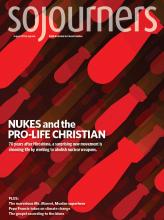AS THE FATE of the world hangs in the balance, one humble pastor—leader of the world’s smallest nation-state—offers a word. Well, closer to 40,000 words.
Pope Francis’ much awaited social teaching on ecology was released in June to global acclaim and thunderous Twitterapplause. Laudato Si’ (“Praised Be to You”) takes its name from a line in St. Francis of Assisi’s “The Canticle of the Creatures,” written in 1225. The encyclical lays out the house rules for this earthly commons we share—archaea, bacteria, and eukaryota alike. (Google it. You, me, all the fauna and flora, are part of eukaryota.) So, what do you need to know?
1. The news is not good. The world’s leading spiritual physician has diagnosed “every person living on this planet” with a progressive and degenerative disease. A soul sickness has spread through us to infect the soil, seas, skies, and even the seasons. Among humans, the poorest have the least resistance and the richest are the major vectors. This disease multiplies in isolation and loneliness, with symptoms of obsessive consumption, greed and corruption, and habitual narcissism. “The external deserts in the world are growing, because the internal deserts have become so vast.”
2. This disease is having dire consequences: objectification of the other, a failure of awe in the presence of beauty, and a defiance of reality by those who claim the “invisible forces of the market will regulate the economy” and dismiss the impact on society and nature as “collateral damage.”
Read the Full Article

